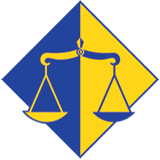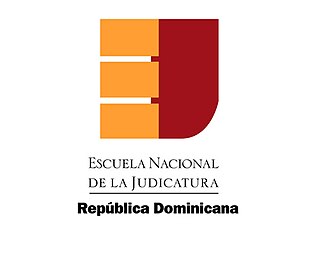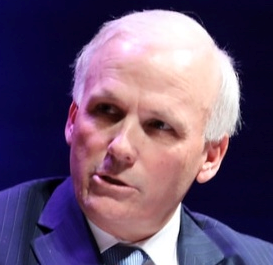Judicial independence is the concept that the judiciary should be independent from the other branches of government. That is, courts should not be subject to improper influence from the other branches of government or from private or partisan interests. Judicial independence is important for the idea of separation of powers.
The judicial system of Ukraine is outlined in the 1996 Constitution of Ukraine. Before this there was no notion of judicial review nor any Supreme court since 1991's Ukrainian independence when it started being slowly restructured.

John Mercer Walker Jr. is a senior United States circuit judge of the United States Court of Appeals for the Second Circuit. He served as chief judge from September 30, 2000, to September 30, 2006, when he assumed senior status. He was a United States district judge of the United States District Court for the Southern District of New York, appointed in 1985 by President Ronald Reagan before being elevated to the Second Circuit in 1989.

The Supreme Court of Georgia represents the court of the highest and final administration of justice in the country. It was established in 2005 as the cassation instance court. It is located in Tbilisi, the capital of Georgia, in a building designed by Aleksander Szymkiewicz and built in 1894.

The Federal Judicial Center is the education and research agency of the United States federal courts. It was established by Pub. L. 90–219 in 1967, at the recommendation of the Judicial Conference of the United States.

The High Judicial and Prosecutorial Council of Bosnia and Herzegovina is the national council of the judiciary of Bosnia and Herzegovina. It is the self-regulatory body of the judiciary in the country, tasked with guaranteeing its independence, with countrywide competences over the administration and career management of judicial office holders. It is based on the continental tradition of self-management of the judiciary.

D. Brooks Smith is a senior judge of the United States Court of Appeals for the Third Circuit. He was previously Chief Judge of both the United States Court of Appeals for the Third Circuit and the United States District Court for the Western District of Pennsylvania, and is the only judge in the history of the Third Circuit to have served as both a chief district judge and chief of the Court of Appeals.
Recent decades have seen a surge in the birth of "supraterritorial institutions and associations", that have been gathered by their enactment of common law and practices. European Union's regional expansion into Southeastern Europe to include Romania is one such example. The community of European states has enacted treaties that have allowed them to unite politically and economically.

The judiciary of India is a system of courts that interpret and apply the law in the Republic of India. India uses a common law system, first introduced by the British East India Company and with influence from other colonial powers and Indian princely states, as well as practices from ancient and medieval times. The Constitution of India provides concept for a single and unified judiciary in India.

The Siracusa International Institute for Criminal Justice and Human Rights, until 2017 Istituto Superiore Internazionale di Scienze Criminali (ISISC) is a not-for-profit organisation located in Syracuse, Italy, that was established in 1972. The organisation specializes in the design and implementation of human rights, rule of law, justice and capacity building projects throughout the world. The organisation pays particular attention to such issues that arise from situations in Arab and Muslim countries.
The ABA Rule of Law Initiative was established in 2007 by the American Bar Association to consolidate its five overseas rule of law programs, including the Central European and Eurasian Law Initiative, which was created in 1990 after the fall of the Berlin Wall. Today, the ABA Rule of Law Initiative implements legal reform programs in 50 countries in Africa, Asia, Europe and Eurasia, Latin America and the Caribbean, and the Middle East and North Africa.

Judicial independence is protected by Singapore's Constitution, statutes such as the State Courts Act and Supreme Court of Judicature Act, and the common law. Independence of the judiciary is the principle that the judiciary should be separated from legislative and executive power, and shielded from inappropriate pressure from these branches of government, and from private or partisan interests. It is crucial as it serves as a foundation for the rule of law and democracy.

Mary McInnis Boies is an American attorney working as counsel to Boies Schiller Flexner LLP, where she specializes in antitrust and corporate commercial litigation. Mrs. Boies was a founding partner of the American law firm Boies & McInnis LLP. The law firm, established in 1988, specialized in antitrust and corporate commercial litigation.

Nihal Mahendra Sudrikku Jayawickrama is a Sri Lankan academic. He was the former Permanent Secretary to the Ministry of Justice (1970–1977), Professor of Law at University of Hong Kong (1984–1997), Ariel F Sallows Professor of Human Rights at the University of Saskatchewan, Canada (1992–1993), and Executive Director of Transparency International (1997–2000). He is now an independent legal consultant, and has been the Coordinator of the UN-sponsored Judicial Integrity Group since 2000.

The Centre of Policy and Legal Reform is a Ukrainian non-governmental think tank founded in 1996.

The National Judicial College(ENJ in Spanish) is the body that is responsible for training and ongoing formation of all servers in the Dominican Judiciary. As an educational institution is recognized by the National Council of Higher Education as a Specialized Institute of Higher Studies.

Mark Steven Ellis is an international criminal law expert and the executive director of the International Bar Association. He is the current chair of the UN-created Advisory Panel on Matters Relating to Defence Counsel of the Mechanism for International Criminal Tribunals. He also serves as Chair of the Management Board of the Central and Eastern European Law Initiative (CEELI) Institute.

The International Institute for Justice and the Rule of Law, also referred to as The IIJ or Malta Institute, is an International body, which aims to improve governance within underdeveloped countries, with its main focus on counter-terrorism. The IIJ was founded in 2014 by twelve founding nations and is based in Valletta, Malta. It is often referred to as a Global Counter-Terrorism Forum inspired institution. The founding nations include the Netherlands, United Kingdom, France, the United States and the EU. It also partnered with a number of International federations, such as the United Nations and the EU.
The International Association of Women Judges (IAWJ) is a non-profit non governmental organization founded in 1991 whose members are judges from around the world committed to equal justice for women.
Judicial reform in Ukraine is a set of legislative, institutional and personnel changes aimed at improving the Judiciary of Ukraine.












